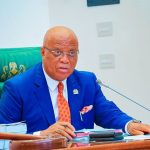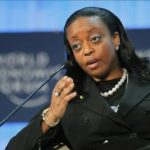The Senate Committee on Public Accounts has insisted that the Nigerian National Petroleum Company Limited must account for a staggering ₦210 trillion that remains unexplained in its audited financial statements.
At a hearing on Thursday, the committee gave the Group Chief Executive Officer of NNPCL, Mr. Bayo Ojulari, a deadline of July 10 to appear and respond to 11 outstanding questions related to the company’s financials.
This follows ongoing scrutiny of NNPCL’s audited records for the 2017–2023 period, during which the Senate raised concerns about what it termed “vague financial information.”
“We never said NNPCL stole ₦210 trillion, but we insist you must account for ₦210 trillion. You have an account that is not netted off, so it can’t be acceptable to us,” said Senator Aliyu Wadada, the committee chairman, during the reconvened session.
Despite being expected at the hearing, Ojulari was absent. He delegated the Chief Financial Officer, Mr. Dapo Segun, who informed the committee that the GCEO was representing Nigeria at an Organisation of the Petroleum Exporting Countries meeting abroad and would not return before the weekend.
The explanation did not sit well with several senators. Senator Abdul Ningi criticized Ojulari’s absence, remarking that his ability to attend international meetings was granted by the Nigerian people, who now expect him to be accountable.
“Today, the same Nigerians, through the Senate, are asking you to come and explain your financial statement, and you are not available,” Ningi stated.
Senator Adams Oshiomhole went further, describing NNPCL as “dirty” with “a track record of corruption.” He emphasized the company’s obligation to update Nigerians on the management of oil revenues. “Anybody who is too big to obey the Constitution of Nigeria should relocate. We are empowered by our constituents to do what we are doing,” he said.
Senator Wadada also rejected suggestions that the committee lacked the expertise to interpret the company’s financial documents. He cited the credentials of its members, including former governors, chartered accountants, and a Senior Advocate of Nigeria (SAN).
“It is insulting if you say Senator Ibrahim Dankwambo, a former Accountant-General of the Federation and governor; Senator Ede Dafinone, whose family is all about accounting practice; of course there is our SAN here; or is it Senator Abdul Ningi, who has spent many years in the National Assembly looking at budgets after budgets — that all these people do not understand the financial statement of the NNPCL?” Wadada said.
Segun did not respond to further questions during the session, which was adjourned until Tuesday next week. A new appearance date will be communicated to Ojulari.
Wadada also offered background on the ongoing dispute, revealing that the committee identified troubling entries in NNPCL’s financial records. “The explanation of what led to the NNPC’s audited financial statement from 2017 to 2023, which, of course, having looked at that document, we came up with questions. But the specific ones today, the most important, were the ones I asked before we eventually decided to give them all the 11 questions and then the ultimatum of one week for them to respond to.”
He continued, “In the audited financial statement, they said accrued expenses were — and still are, since that is what is contained in the statement — ₦103 trillion. And what makes up accrued expenses are, one: retention fees, legal fees, and auditors’ fees. Retention is known, of course, to be 5% of the total contract sum. And no reference, no mention, was made to the contracts that led to this retention. And the retention figure is ₦600-and-something billion. And then the accrued legal fees — no details of legal engagements that led to the fee were attached to the legal fees.”
Wadada further noted, “And the auditors’ fees — we have all seen what you’ve seen, you’ve heard and listened to the audited financial statement that was produced by the auditors of NNPC. The next thing of concern is the receivables. The receivables are ₦103 trillion. Ironically, completely independent of what is contained in the audited financial statement relating to these receivables, just this afternoon, before the commencement of the exercise, NNPC brought a new document — a document to the committee that is completely independent of what is contained in the audited financial statement and with items that contradict the items contained in the audited financial statement. This we found very ridiculous, very unacceptable by the committee. You have listened to all that transpired, and the questions are now handed over to them. It is important for the public to know each of these questions emanated as a result of what we discovered from the audited financial statement of NNPC from 2017 to 2023.”
He stressed that the discrepancies—covering accrued expenses and receivables—amount to over ₦210 trillion.
“And in this day and age — I mean, permit me to say, in Nigeria of today — that President Bola Tinubu, as headmaster of the project called Nigeria, is committed to changing the narratives in the system. Changing these narratives, which are enveloped by the Renewed Hope Agenda, cannot be achieved without the needed and required funding. So, it is a government that needs all the support for funds to be made available to it. And under such a quest, these figures are mind-boggling, they are scary, they are, of course, worrisome. For us, as representatives of the people, we will do the best we can. I know for a fact that this will not just go down the drain.”
“Well, how can it be erroneous? It all emanated — the figures emanated — from the audited financial statement of NNPC. And you’ve heard the contradictions. They said reconciliation had not been done. So if reconciliation was not done, why did they sign off on the audited financial statement? And this audited financial statement is already in the public domain. And NNPC is planning to go to the market for an Initial Public Offering (IPO).”











